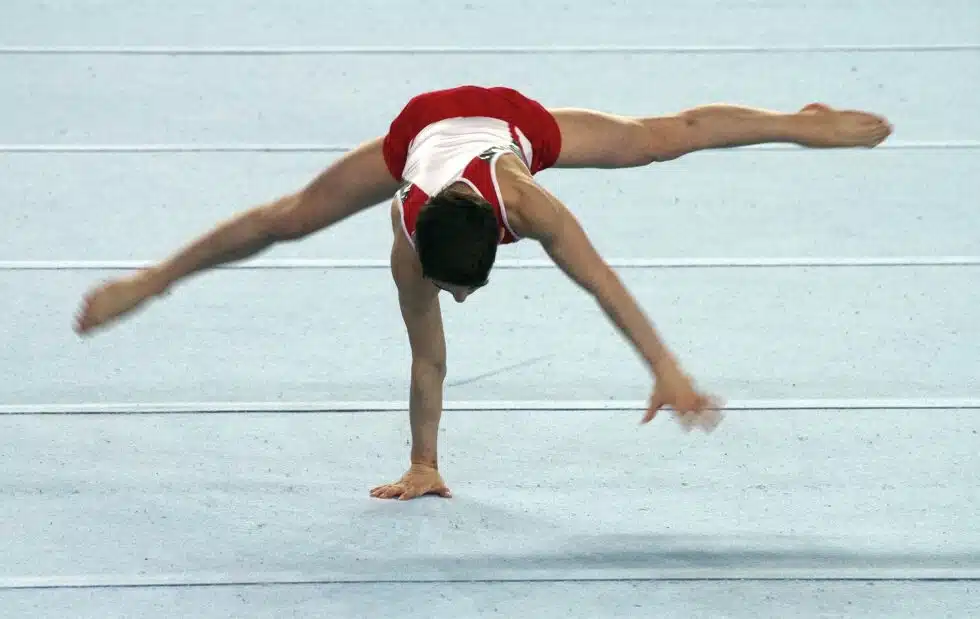Do you have “the twisties?” – Anxiety Can be disorienting
It’s time for the 2024 Summer Olympics!
I get swept up in watching the top athletes pursue their dreams after working hard for years (and really, for most of their lives). While there are many different athletes and sports to watch, I am most drawn to the USA Women’s Gymnastics team. Gymnastics fascinates me because each apparatus (beam, bars, floor, and vault) has a combined score of excellence and difficulty which combines athleticism and artistry.
If a gymnast does a new move successfully in an international competition, the move is named after that gymnast (cool!). Simone Biles currently has five moves named after herself, but we forget that her journey hasn’t always been easy.
In the 2020 Tokyo Olympics, Simone Biles found herself needing to leave the women’s team. At the time, Biles explained it was for her “mental health” and later updated the world on what gymnasts known to be “the twisties.” Now, I am not a gymnast in any way shape or form, and I remember the confusion surrounding Simone’s decision.
See, when a gymnast experiences “the twisties,” it’s the inability to keep track of where their body is in the air. People have described this experience as their mind doing one thing while their body does something else entirely. The issue wasn’t that Biles was too weak to complete her routines, but rather the intense increase of risk when flipping 12 feet in the air, not knowing if she would land on her neck or head.
Yet, when Biles made the decision to step away, people across the country began to call her weak. Sports commentators to social media influencers were saying she needed to keep going and “be strong.” Biles talks in her documentary about the healing she needed to do in order to return to the 2024 Olympics…and how her healing was physical, mental, and emotional.
While I prepare myself for the 2024 Olympics games and Biles’ return to the gymnastics team…
I can’t help but feel that many of us may be attempting to white knuckle our way through our own “twisties.”
When we begin to feel anxiety, depression, or begin to work our way through a trauma, it can feel like our bodies become disconnected from our minds. We want to go one way and parts of ourselves lead us in another direction. While we may not have the risk of breaking our necks, this doesn’t mean it’s any less distressing.
We can feel unsettled and lost, fighting to do what we hope is best, but not entirely sure what that is.
In the middle of our distress, a common anxiety response is to zero-in on a single negative thought, and spend a ton of energy trying to “fix” that one problem in our minds. We want something to give us comfort and peace—whatever we can fix becomes the focus. Sometimes there is momentary comfort or reprieve from anxiety when we do this, but we still feel disoriented in mind and body.
Logically explaining our experiences can give us insight, but just insight by itself can be insufficient.
If you are dealing with your own “twisties,” I have a question–what if the healing you’re hoping for isn’t drilling a new set of habits into your brain, but being curious and compassionate towards all parts of yourself? We are not simply a brain separated from a body, but we are brain and body. Yet, we tend to overemphasize our brains (our thoughts) and neglect what our body could be telling us.
Does this emotion make me feel tight in my stomach or throat?
Does this emotion make my heart beat fast, or my chest feel tight?
How do I interpret these sensations in my body?
Asking questions like these with curiosity helps us align our minds and bodies, and live more fully into our Spirit-filled selves. And if you feel stuck in anxiety or these exercises feel overwhelming, it can be helpful to talk about them with a therapist. I am always honored to help clients find wholeness within their minds and bodies.
is anxiety keeping you from your own journey to healing?
In her documentary, Biles talks about how she almost didn’t do another Olympic run, but her desire to live fully pushed her onto a journey of healing. Is anxiety keeping you from moving forward, too?
- What do you want back from life?
- Are you willing to look at these emotions, and listen to what they want to tell you?
- Are you willing to step into your own journey of healing?
While I can not say the results of the 2024 Olympics yet, I am excited to sit and watch Biles’ courageous journey continue to unfold…I would be overjoyed to do the same for you too.
Written by Rachel Zenisek, M.A., LPCC

Take the first step
You might feel stuck in anxiety right now, but here’s a little nudge—reach out. Talking to someone who understands can make a world of difference. At Cornerstone Christian Counseling, we’re here to walk this path with you. You don’t have to feel this way, and with the right support, things really can get better.
FIND A CHRISTIAN THERAPIST
Research shows that much of the change people experience during their time in therapy is because they felt heard and understood by their therapist–that their therapist “got them” and that the guidance they gave was relevant and applicable. Because of this, it is critical that you find a therapist whom you can connect with, whom you feel comfortable with, whom you feel “gets you.”
If this story resonates with you, you can schedule with Rachel here.
If you’re not sure where to start, or if you prefer to look at counselors who specialize in anxiety nearest to you, please click the office location buttons below. Otherwise, you can meet with Rachel or any of our Christian Counselors online from the comfort of your own home. If you have questions, please contact us!





